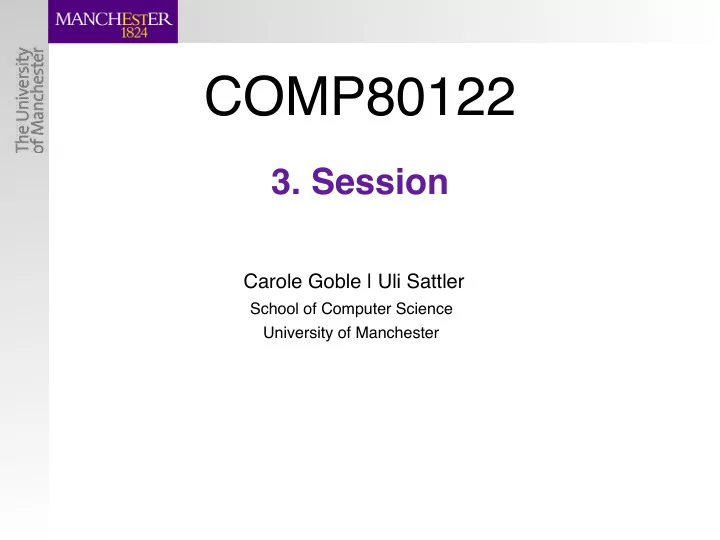

COMP80122 3. Session Carole Goble | Uli Sattler School of Computer Science University of Manchester
The Three Pillars The story The speaker The slides • • story lines • bullet lists body language • clarity • graphics – focus • • level • fonts preparedness • • timing • highlights voice • use of terminology • ... – volume – speed • ... – clarity • nerves • ... Effects on you/audience by choices to these? What was helpful to get message across?
Things not discussed Monday • Moving around • Clothing • Arms/Hands body language • Water/drinking • Notes • Nerves • Technical Issues: projector, adapter, … • …
Storyline: relevant points • Setting the scene: – research area – your problem in general – why is that interesting/relevant? • Focus: – your Research Hypothesis/Question • Methodology/approach/work done: – what you have done/learned so far • Context: – how it relates to other people’s work • Contributions made: – which new insights were gained – did you dis-prove your research hypothesis/answer question? • Outlook/next steps/open questions
Different Methods of CS Research after Chris Johnson Implementation or build driven: Goal is to produce some artefact (software system, a data set,…) Formal methods and mathematical proof: Uses formal mathematical methods to prove a system has given properties (may involve design of the system). Empirical methods: Design, run, & evaluate experiments to test hypothesis. Observational studies: Determine how systems perform in real use (special of the above?) Simulation: Design & implement/adapt computer simulations to test hypothesis (one that is difficult to answer in the real application) …?
In your PhD project • you will probably use/combine more than one of these methods • e.g., 1.design & implement a system 2.design an experiment to (dis)prove your hypothesis • are there other methods? • did you see others in RS?
Elevator Pitch Exercise • 5 minutes to think about 1-4 In 2 sentences each, describe • take notes 1. General Problem Area • mix 2. Your Research • regroup into groups of 3 Goal/Hypothesis/Question • each of you 3. Your Method/Approach/Steps • describe 1-4 to your 4. Your Plan to check whether you have group members achieved/(dis)proved/answered (2) • answer their questions
Organisation of your presentations
Your COMP80122 presentation: • will take 15 minutes • describes your research, from your – PhD – taster project – MSc – or similar, whatever you think is suitable • will take place in small groups (~15 people) • will be discussed in detail
To pass COMP80122, you • submit your 10 critiques – which you should have done already • give your presentation – and take note of its discussion • attend your fellow students’ presentations – and participate in their discussions
Group Organisation • Find your group: – U1, U2 – C1, C2 • Decide on an order in which you give your presentation – ‘old’ students first • Note your ‘group availability’
Recommend
More recommend